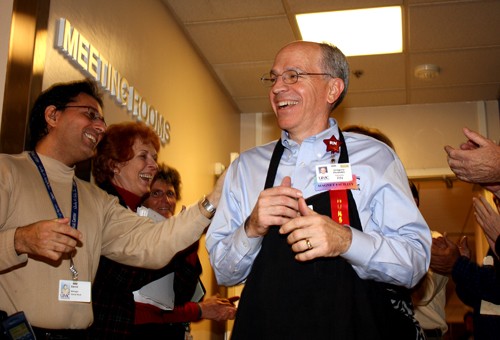In the 22 years Greg Pivirotto served as president and chief executive officer of University Medical Center, he made it a point to treat all of his staff, including doctors, nurses and custodians, as family.
On Friday, Pivirotto’s extended family gave him a retirement party, which was complete with the Pride of Arizona pep band, playing “”Bear Down,”” ice cream and the halls of the cafeteria lined with employees to wish their boss well in the next phase of his life.
“”I’m overwhelmed,”” Pivirotto said. “”Just unbelievable. This almost brought me to tears.””
Pivirotto oversaw a hospital that had 300 beds in 1988, and has grown to 550. The number of employees has jumped from 1,200 to 4,000.
“”He made an effort to get to know everyone here,”” said Gwen Lewis, an exercise specialist at UMC. “”Even if it was his off-time working out, he made an effort to say hello to those he knew and those who were new he always introduced himself and he always had a positive sprit. He is going to be missed.””
Karen Farwell, blood and marrow transplantation coordinator at the Arizona Cancer Center at UMC, added, “”He’s one of the great bosses in my career. He’s a diamond in the rough.””
During his tenure, UMC was consistently ranked as one of the best hospitals in the country, and earlier this month, it was ranked among the 10 best by Becker Hospital Review magazine. The University Healthcare Consortium also recognized UMC as a top-five academic medical center for quality and safety.
“”Greg has even said out of his own mouth that a hospital doesn’t run unless everyone does their own job,”” said Rob Bailey, manager of the Pivirotto Wellness Center. “”You can’t do an operation unless the operating room is clean. We all depend on each other.””
Pivirotto has overseen many changes over the years, from the hospital becoming the only Level-I trauma center in Southern Arizona, to the construction of the Diamond Children’s Medical Center, which is set to open later this year.
Pivirotto said he also has high hopes for the Arizona Cancer Center, located at 3838 N. Campbell Ave.
“”I think (the Arizona Cancer Center) is going to be the next major campus for the UA,”” he said. “”It’s actually programmed right now to have seven or eight more buildings and it will be bigger than that someday.””
Despite his successful career, there were some low points. The lowest point for Pivirotto came in the 1990s when the Balance Budget Act of 1997 forced UMC to make cuts, which included job cuts.
“”My biggest regret is when we had layoffs in the ‘90s,”” he said. “”To this date I’ve regretted it.””
That experience helped Pivirotto when UMC faced a similar situation last year.
“”We had huge meetings in the auditorium and I promised the staff that we were going to have a wage freeze,”” he said, adding that he told them, “”I promise you that I’m going to work hard and there won’t be any layoffs.””
While Pivirotto will be remembered as a boss who treated everyone equally and cared for the patients and employees at UMC, his legacy will be a wellness center that bears his name.
“”I was actually criticized for putting it in. People were saying it was a waste of health care dollars,”” Pivirotto said. “”But we have 1,500 members, staff, doctors, interns. People love it.””
The Pivirotto Wellness Center is 7,000 square feet and features full-size locker rooms. It is open to patients as well as staff.
“”This place started as a gym and now we offer programs that we would never be able to do 13 years ago (when the center opened),”” Bailey said. “”For patients that require a little more help to get out of the hospital, we have a facility where we can bring them down here and they can actually do exercise and activity. We’re able to launch research projects from this facility that go nation-wide.””
While Pivirotto did a lot in terms of transforming UMC, he knows there is still a lot of work that needs to be done.
“”This place will always be growing. It’s so much bigger than when I came here and that’s going to continue,”” Pivirotto said. “”I said this to somebody the other day, ‘There is a part of me inside that said there is so much that is unfinished yet.’ Then they said to me ‘Greg, it will never be finished,’ and at some point you have let the next group do it.””









